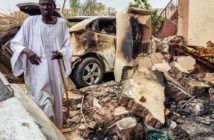Does Islam make use of violence?
Born in the 7th century, in the belligerent context of the Bedouin tribes of the Arab peninsula, does the Islamic religion have an aggressiveness, inherent to this original civilisation?
While Christian religion was built on the total abnegation of the first martyrs, based on an ideology of absolute non-violence, the Islamic religion has imposed itself, since the very beginning, through war.
Never did the Prophet hesitate to engage in a fight to subdue the tribes or families whose influence opposed his political and religious project. Never the regret of necessity has been pronounced; the action was “normal” and understood within the Bedouin’s cultural framework.
Also, the question of illegitimacy poses itself (“illegitimacy” over-repeated everywhere in a politically correct way) about the call to Jihad by the Imam-Caliph Ibrahim, head of the Islamic State, whose aim would be to restore the ancient Arab empire and to promote Islam on a global scale.
What if, really, the violence of Jihad, as proclaimed by the Islamic State, was acceptable to Islam?
We have heard many answers to this question, coming from well established imams in the Western capitals, happy to be renowned and desiring to remain as they are, or from Muslim dignitaries, submitted to Arab secular dictatorships, who unanimously condemn Salafist Islam. As was the case, quite surprisingly, of the al-Azhar University, in Cairo, one of the most prestigious Islamic authorities, but whose servility toward the newly imposed totalitarian regime, put into place by the military coup, has considerably burdened its reputation. Had Al-Azhar not confirmed the validity of the death penalties pronounced by the judicial power, concerning the Muslim Brotherhood, overthrown by the army?
Spoiled by mainstream media, these unified voices denouncing the Salafist violence and condemning the “Islamic State organisation” (as they say) have monopolised the space of public expression, without ever being confronted to their opponents; no debates or discussions, always carefully avoided by these very consensual press organs – perhaps because it is too risky?
It is hence of great importance to somewhat re-establish the equilibrium and to return to a fundamental principle of journalism: to give the reader the access to different points of view, so as to enable the shaping of an own opinion.
Especially, it is about time to obtain the right to hear the different discourse, that of the “fanatics” and of the “radicalised”, so as to re-appropriate yet another right, that of knowing, and hence, of understanding.
It is another discourse that is not as incoherent or unfounded as the unanimity of the media may have liked to make believe… A discourse, anchored in the koranic teachings and of a logic that is as surprising as it is implacable… and worrying, from the Western perspective… In brief, a discourse that disturbs and perturbs the certainties and convictions distilled by the dominant and well-meaning press, and which, once heard, does not leave much doubt about the reasons why some may have preferred to keep silent about.
It raises very consequent questions, at a time in which the re-conquest of Syria is happening, through the forces of Bashar al-Assad – now a hero and defender of the (Christian?) West against the barbaric Islamist hordes, still far away from admitting their defeat.
The combination of Russian strikes and successive ground offensives of the Syrian army does indeed restore the authority of the regime over the country; in the background the umpteenth round of improbable negotiations in Geneva, whose only reason of being seems to be upholding the illusion for a decomposing opposition that political change in Syria is still possible. All this, whilst Moscow announced the retreat of its army – news that surprised many – and is now busy crowning President Putin as the winner of the international diplomatic game, running in parallel to the Syrian conflict. On the ground, the progression of the Syrian army, flanked by the Iraqi and Iranian Shiite militias and the Lebanese Hezbollah, pursues inexorably its course, aided by the Russian air strikes and beyond discussions and editorials of all sorts…
This advance of the military forces of Bashar al-Assad also depends on the secret (or at least tacit) agreement between Damascus and the Syrian Kurdish militias of the YPG, who are as of now good allies against the Islamic State (and also against the relics of other rebel formations).
Supported by the PKK, which created them, these Syrian Kurdish militias enrage Ankara, which is from now on engaged in an open war with the Kurds of Syria, but also with those of Turkey.
A very embarrassing situation for the President of the autonomous government of the Iraqi Kurdistan, Massoud Barzani, and his party, the KDP, allied to President Erdogan and constrained to support him, including against the PKK and its main supporter, the PUK, the other big Kurdish party in Iraq. An embarrassing but also very dangerous situation, which multiplies the tensions within the Kurdish union, resuscitating the memories of the 1990s, a period when the KDP Peshmergas, perched on the tanks of Saddam Hussein, assassinated their brothers of the PUK…
In the meantime, the international public opinion is becoming used to the state of being besieged.
The Jihadist attack launched from Libya onto the border town of Ben Guerdane, in Tunisia, did not make great headlines; not more than the latest street battle to date – in Brussels – which opposed the Belgian police forces to the fighters of a new cell of the Islamic State…
And the recent bomb attacks at the national airport and the metro of the Belgian capital didn’t surprise anyone.



